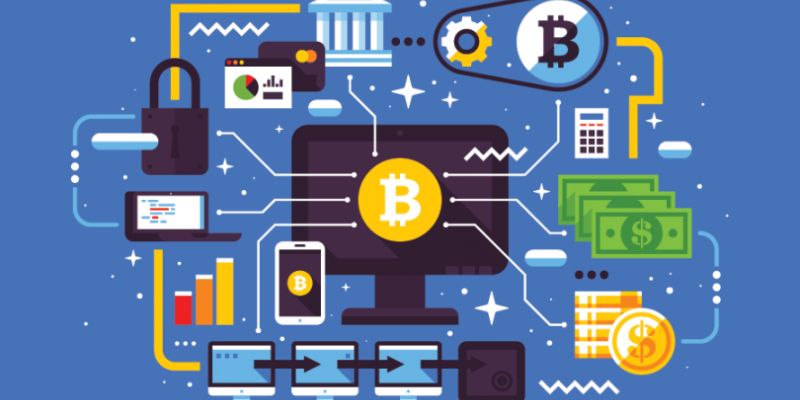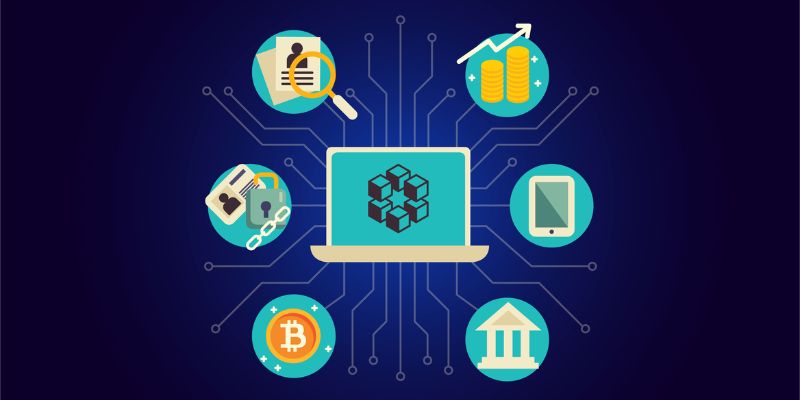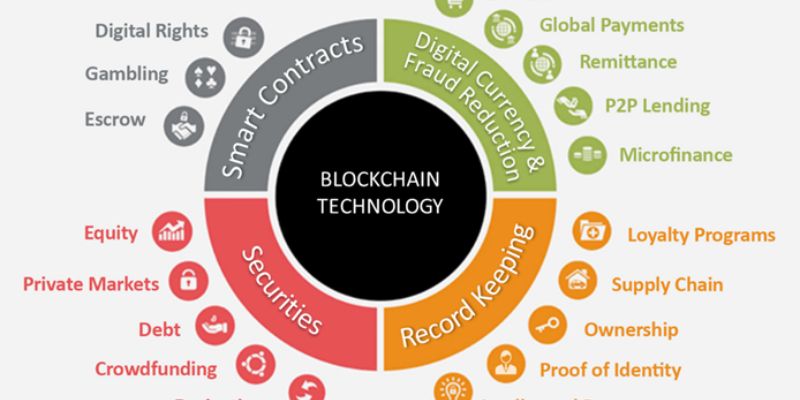Blockchain Unleashed: Revolutionizing Industries Beyond Cryptocurrency
Forget what you know about blockchain as just crypto’s backbone. The true power lies in the applications of blockchain. It’s changing how we trust contracts, save our digital selves, and even how we buy homes. It’s not the future—it’s now! Imagine contracts that seal the deal without a pen. Think about a pill bottle that tells its own tale from lab to hand. This is real stuff, making life smoother right under our noses. Let’s dive into how blockchain is making its mark, way past digital coins.
Embracing Smart Contracts Beyond Currency Exchange
Revolutionizing Legal Processes with Self-Executing Contracts
Smart contracts change how we make deals. We no longer need to trust others blindly or worry about them breaking promises. It’s like a vending machine for any contract: you put in what’s needed, and the contract does its job without fail. Everyone sees what goes in and what comes out, but no one can tamper with the machine.
Blockchain tech makes contracts work on their own. To explain, once set up, they check conditions and execute only when those are met. It’s like an autopilot for agreements. This is huge for legal stuff. It cuts out the middleman, which saves time and cash.
Now, let’s look at ways smart contracts help beyond money trades.
Lesser-Known Use Cases: From Intellectual Property to DAOs
Smart contracts go far beyond buying and selling coins. They power up things like NFTs, which prove who owns digital stuff. This is big for artists and creators. Their work stays safe, and they get what they’re due, every single time.
They also shake up how companies run. I’m talking about DAOs – groups ruled by code, not by CEOs. Members vote on every move, and records are clear for all to see. This makes decisions fair and fast, with no shady behind-the-scenes moves.
Think of your stuff, too—like a song or invention. Blockchain keeps your rights safe. If someone tries to steal your stuff, the record’s there, clear as day.
And that’s just a taste. Smart contracts play into loads of areas—voting, real estate, even keeping our food safe. Where trust is key, they step in and make things work better.
The takeaway? Blockchain and smart contracts are a game-changer. They make things we once dreamed up not just possible, but normal. Imagine a world where trust issues are history. That’s the power they bring, beyond just money.
The Pulse of Decentralized Finance (DeFi) Across Sectors
Empowering Peer-to-Peer Financial Innovations
Imagine sharing money without a bank in the middle. That’s DeFi for you. It allows people to lend, borrow, and trade directly with each other. Decentralized finance gives everyone a fair chance. It uses blockchain to make this happen.
People around the world are already using DeFi. It’s not just talk. Smart contracts are the heroes here. They’re like deals that run by themselves when conditions are right. These don’t need a person to check if the deal is followed.
This means loans get easier. You can prove you own something without much hassle. And you can earn more from savings as well.
Exploring DeFi in Real Estate and Cross-Border Payments
Now, real estate can join the fun. Traditionally, buying a house was slow and filled with paperwork. Blockchain can change that. It does this by making ownership into a digital token. Selling a house becomes as simple as sending an email.
The real magic is in cross-border payments. Sending money overseas is often costly and slow. Blockchain cuts out delays and fees. Your money moves fast and at less cost.
These aren’t just ideas. They’re real ways blockchain is changing the game. Blockchain isn’t just for tech folks. It makes life better for all of us. We can save time, cut costs, and be in charge of our own money. Now that’s a world worth aiming for.
Strengthening Supply Chains with Distributed Ledger Technology
Enhancing Traceability in Food Safety and Pharmaceuticals
Do you know how blockchain keeps our food safe? It’s like a secret detective. It tracks food from farms to stores. This makes sure it stays good to eat. It’s also great for meds. It stops fake ones from hurting people.
Blockchain lets us see every step with food or pills. When a farmer picks an apple, they tell the blockchain. Then, whoever gets the apple next does the same. This goes on until you buy the apple. If something goes wrong, we can find the problem fast. We can stop more bad food or meds from reaching more people. This keeps everyone safer.
Boosting Efficiency: Blockchain in Manufacturing and Retail
The same cool tech also helps make stuff and sell it. In making things, it makes sure all parts are there on time. This means less waiting and no mix-ups. Shops use blockchain to keep shelves stocked. They know just when more things are coming. They can tell you if something you want is there or not.
For both, if a machine breaks or a shirt rips, they can find out why. Then, they can fix it quickly. This tech makes sure we don’t waste time or money. It’s smart and it helps all of us every day.
So, blockchain is a big deal, not just for computer money. It helps with what we eat, take when sick, how things get made, and what you buy. It’s like a super tool that makes everything work better together.
Blockchain’s Role in Digital Identity and Healthcare Systems
Establishing Trust with Blockchain-based Identification
Claiming who we are online can be tricky. Large firms often control our online identities. This can lead to trouble when data gets leaked. Blockchain offers a better way. It lets us own and manage our digital selves.
How does blockchain ensure secure digital identity verification?
Blockchain creates permanent, unchangeable records of who we are. We control who sees it, using keys. This system stops fraud and builds trust. With blockchain, no one company has all the power over our data. We can trust our info’s safe and we can share it quickly.
After a huge data breach, people often worry. They ask, “Is my info safe?” Using blockchain, we can show who we are without big risk. We can sign in to websites, prove age or identity, all without revealing too much. If we need a background check or to show qualifications, blockchain makes it simple and safe.
Secure Medical Records and Data Privacy within Healthcare
No one wants their health secrets spilled. Yet, healthcare systems face hacking often. Blockchain can change this. It makes patient info more private and hard to tamper with.
What’s the role of blockchain in protecting medical records?
Blockchain stores health records in a way that’s safe and easy to share. Doctors can see your history fast, without the danger of hacks. No one can change these records without others knowing. With our permission, experts can access our health data for research, making healthcare better for everyone.
Imagine going to a new doctor. Instead of a stack of forms, you give access to your blockchain health profile. The doctor gets your full health story. When you leave, your visit notes join your profile. It’s secure and only you can let others see it.
In an emergency, this can save lives. Doctors can act fast with your health history in front of them. After you’re better, sharing your story with researchers could help others.
Blockchain in healthcare means your private health info stays that way. It helps doctors help you. Our info can help cure diseases while still keeping your data safe. Blockchain in healthcare is really about giving power back to the patient. It’s about taking care of our health data as well as we take care of our health.
Smart contracts can change how we handle legal stuff. They do jobs without needing people to start them. They keep ideas safe and help groups make choices together. They power up giving and lending between friends, change the game in owning houses, and make sending money over borders easy. These contracts also make sure we can follow where our food and medicine come from. Businesses make things faster and sell better with them. In your wallet and at the doctor’s, your personal info stays yours because blockchain keeps it safe.
I’ve seen these changes happen. They make big waves in how we trade, own things, and trust each other. Smart contracts are key for a future where dealings are clear, quick, and safe. Keep an eye out – this tech will pop up in your life more and more. Trust me, it’s worth your time to understand it now.
Q&A :
What are some common applications of blockchain technology?
Blockchain technology, renowned for its role in cryptocurrency systems like Bitcoin, extends its applications across various industries. It is widely utilized for improving security, transparency, and the integrity of data without the need for a trusted third party. Key applications include supply chain management, enabling real-time tracking of goods and authentication, smart contracts that automatically execute when conditions are met, and exchanging personal identification information in a secure manner.
How is blockchain being used outside of cryptocurrency?
Aside from the financial sector, blockchain has profound implications in other fields. In the healthcare industry, blockchain helps secure the sharing of medical records while preserving patient privacy. In real estate, it simplifies the process of buying and selling property by transparently and securely recording transactions. Additionally, in the sector of voting systems, blockchain can be employed to create undeniably transparent and tamper-proof systems, enhancing democratic processes worldwide.
Can blockchain technology enhance the security of data storage?
Blockchain provides an advanced method for securing data storage through its decentralized nature. By distributing copies of the database across a network of computers, it becomes significantly harder for hackers to compromise the data. Furthermore, the inherent characteristics of blockchain, such as immutability and cryptographic hashing, ensure that once data is recorded, it cannot be altered without detection, thereby bolstering the security of stored information.
What advancements can blockchain bring to supply chain management?
The introduction of blockchain into supply chain management has the potential to revolutionize the industry. It can lead to significant improvements in transparency, accountability, and efficiency by providing an immutable ledger for recording the production, transportation, and receipt of products in the supply chain. Companies can monitor the authenticity of products, reduce fraud, and even automate tasks and payments through smart contracts, thereby greatly enhancing operational procedures.
How does blockchain support smart contracts?
Blockchain technology is the foundation upon which smart contracts operate. These self-executing contracts with the terms of the agreement directly written into lines of code eliminate the need for intermediaries. The blockchain ensures that once predetermined conditions are met, the contract is executed automatically, with the outcome being irreversible and immediately recorded onto the blockchain. This not only increases trust and efficiency but also significantly reduces the potential for disputes and errors.


